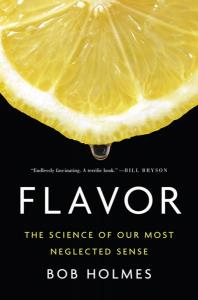Bob Holmes: Flavor
THE SCIENCE OF OUR MOST NEGLECTED SENSE
Bob Holmes
W.W. Norton, April 25, 2017, $26.95
ISBN-10: 0393244423; ISBN-13: 978-0393244427
Also available on Kindle, and as an audio book
Holmes writes:
For a science writer who loves to cook and eat, this book was a no-brainer. The science of flavor is still young: we don't even know how many tastes there are, how odor receptors detect smelly molecules, or why certain foods go well together. I'd written about some of this for New Scientist magazine, and when my agent suggested there might be a book in it, I leapt at the opportunity.
I wanted to do a book that included both basic sensory science and its practical applications in the food world. That broke the book neatly into two halves: one on the senses (taste, smell, and mouthfeel) and how the brain combines them into the perception of flavor, and the other on the industrial flavor companies, farmers, and cooks who are responsible for putting flavor on our plates.
My research, funded by the first third of my advance, started with a trip to the annual meeting of the Association for Chemoreception Sciences, the main meeting for basic scientists in the field. AChemS was ideal — I got to meet most of the top researchers right away. The contacts I made there led to other reporting trips, most notably to the Monell Chemical Senses Center in Philadelphia, where I arranged to have part of my genome sequenced so I could see how my genetic predispositions affect what I choose to eat. (What I thought would be a lesson in genetic determinism turned out to teach me about context and learning instead.)An AChemS contact even got me a visit to Givaudan, the world's largest industrial flavor company, where I got to build flavors from scratch and learn about new frontiers in flavor creation. Elsewhere, I learned the best way to cook a butternut squash (from a squash breeder) and the best way to grill a steak (from a meat scientist in — where else? — Texas).
As a rookie book author, I found the process overwhelming, but the best thing I did was to put all my research and writing into Scrivener. It was a lifesaver–I'll never do another book without it.
Contact info:
- Bob Holmes, 780-989-0974, bholmes@nasw.org Twitter: @flavorscience
- Website: http://bobholmes.org
- Book website: http://books.wwnorton.com/books/detail.aspx?ID=4294992679
- Agent: Peter Tallack, +49-40-4327-4959, peter@sciencefactory.co.uk
- Publicist: Elizabeth Riley, 212-790-9452, eriley@wwnorton.com
NASW members: will your book be published soon? Take advantage of this opportunity for shameless self-promotion. Submit your report for Advance Copy.
Tell your fellow NASW members how you came up with the idea for your book, developed a proposal, found an agent and publisher, funded and conducted research, and put the book together. Include what you wish you had known before you began working on your book, or had done differently.
See https://www.nasw.org/advance-copy-submission-guidelines.
Thinking of writing a book? If you are a NASW member, you may access a list of more than 150 books and online resources to help you craft your book proposal, find an agent and funding sources, negotiate your contract, learn about self-publishing, publicize and market your book, and more at https://www.nasw.org/article/write-book.
Send book info and questions about book publishing to Lynne Lamberg, NASW book editor, llamberg@nasw.org.


